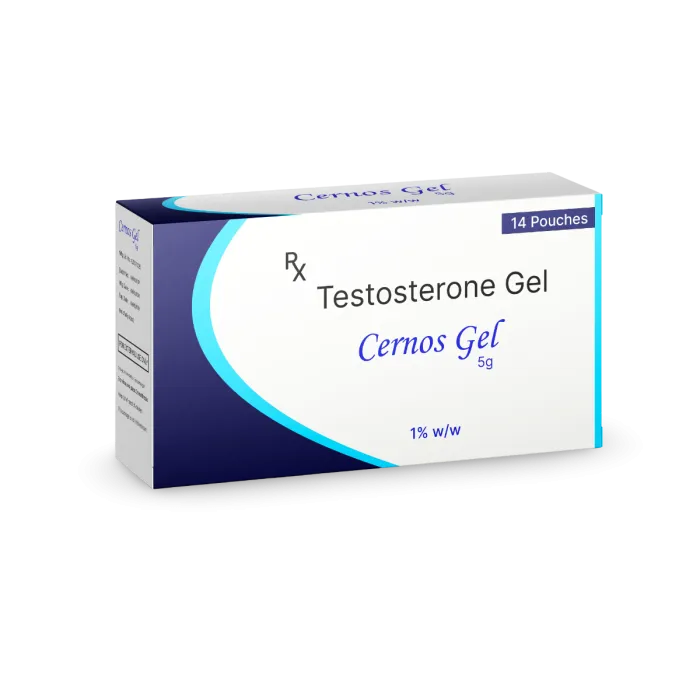Testosterone is a hot topic when it comes to discussions about hormones, fitness, and overall health.
It is commonly associated with muscle growth and anabolic steroids, leading many people to wonder, Is testosterone a steroid? The answer is not as straight as a simple yes or no because testosterone plays multiple roles in the body and can exist in natural or synthetic forms.
In this article, we’ll explore what testosterone is, its effects, and how it differs from anabolic steroids.
By the end, you’ll have a clear understanding of natural testosterone versus synthetic steroids, as well as how different types of testosterone supplements and therapies fit into the picture.
Is Testosterone a Steroid or a Hormone
Testosterone is a hormone primarily produced in the testes in men and, to a lesser extent, in women in the ovaries and adrenal glands. It is responsible for various body functions such as muscle growth, libido, bone density, and the development of secondary male characteristics, including body hair and a deeper voice.
Testosterone is an essential factor for sex drive and can manage low libido in men, as per research by Harvard,
So, is testosterone a steroid hormone? The answer is yes. Testosterone belongs to a group of hormones called the androgens, that are naturally occurring steroid hormones that play a role in both female and male health.
The terminology can be confusing. Testosterone itself is a steroid hormone, as it shares the chemical structure of other steroids. However, when people refer to steroids, they’re often talking about anabolic steroids, synthetic substances used to enhance muscle growth and athletic performance.
Natural Testosterone vs. synthetic steroids is a major distinction; while synthetic anabolic steroids can have potent effects, they’re not identical to the natural hormone.
So, while testosterone is naturally a steroid hormone, anabolic steroids are artificially modified forms designed to increase its muscle-boosting effects.
Save up to 90% on your medicine bills

Cernos Gel 1%w/w

Cernos 40 Mg Soft Gelatin Capsule

Sustanon 250 Injection

Carmel Organics Ashwagandha Extract Tablets
Is Synthetic Testosterone a Steroid
No, synthetic testosterone is not a steroid. Synthetic testosterone is a laboratory-made hormone designed to replicate the effects of natural testosterone in the body.
Synthetic testosterone serves various medical purposes, from testosterone replacement therapy to treating symptoms of low testosterone in aging men. However, it should not be confused with anabolic steroids, which are specifically engineered for rapid muscle growth. There are several different types of synthetic testosterone, including:
- Testosterone Cypionate: This synthetic form of testosterone is often prescribed in testosterone replacement therapy for individuals with low testosterone levels. So, is testosterone cypionate a steroid? Yes, it is a synthetic steroid hormone used for therapeutic purposes, not to be confused with anabolic steroids for bodybuilding
- Bioidentical Testosterone: Bioidentical hormones are synthetically created to match the body’s natural hormones. In other words, is bioidentical testosterone a steroid? Yes, but it functions more like natural testosterone with fewer extreme effects than synthetic anabolic steroids
- Exogenous Testosterone: When testosterone is introduced from an outside source (exogenous), such as through injections or patches, it bypasses the body’s natural production. Is exogenous testosterone a steroid? Yes, it’s a steroid hormone introduced externally, which helps manage hormone levels in people with deficiencies
Health Risks and Side Effects of Synthetic Testosterone
Though testosterone therapy can benefit those with deficiencies, there are some health risks associated with synthetic testosterone use, particularly if misused.
Long-term use may lead to:
- Increased risk of cardiovascular issues
- Liver and kidney strain
- Hormonal imbalances that can suppress natural testosterone production
- Potential emotional effects, such as increased aggression and mood swings
These risks highlight the need for careful medical supervision, especially for those considering testosterone for muscle growth or bodybuilding purposes.
Is Testosterone Replacement Therapy a Steroid
Technically, yes. Testosterone replacement therapy is the administrating of the hormone testosterone to maintain appropriate levels in the body, but it’s a controlled process aimed at restoring natural balance, not for enhancing athletic performance.

Conclusion
To answer- is testosterone a steroid? Testosterone is indeed a steroid hormone, but not all testosterone-related treatments are the same as anabolic steroids.
Whether it’s testosterone cypionate, bioidentical testosterone, or testosterone replacement therapy, the purpose and approach matter greatly. For those seeking testosterone for muscle growth, it’s essential to understand the difference between medically necessary therapies and the misuse of anabolic steroids for bodybuilding.
Ultimately, if you’re considering testosterone therapy or supplements, it’s important to consult with a medical professional. The nuanced relationship between testosterone, steroids, and health deserves careful attention to avoid side effects and make informed health choices.

Frequently Asked Questions
Is it safe for women to use anabolic steroids for muscle growth?
No, the use of anabolic steroids is not safe for women. Using steroids may cause the development of masculine traits like deepening voice and facial hair. It might also cause several health issues. Therefore, it is advised for women to avoid anabolic steroids.
Is testosterone therapy recommended for older men?
Yes, testosterone therapy may be recommended for older men with low testosterone, but only under medical guidance to assess risks and benefits.
What are the signs of low testosterone?
Symptoms include low libido, fatigue, mood changes, reduced muscle mass, increased body fat, and sometimes, depression.
Can testosterone be taken orally?
Yes, oral testosterone exists but is less common due to liver strain. Most therapy involves testosterone gels, injections, or patches, that avoid the digestive system.
Can testosterone therapy help with weight loss?
Yes, testosterone therapy may support weight loss by increasing muscle mass, which boosts metabolism, though it’s most beneficial when combined together with a healthy diet and workout.
Cheap Medicine Shop only refers to credible, authoritative sources for our content. If you’re curious about how we ensure the integrity of our content, we encourage you to read our Content Information Policy.














